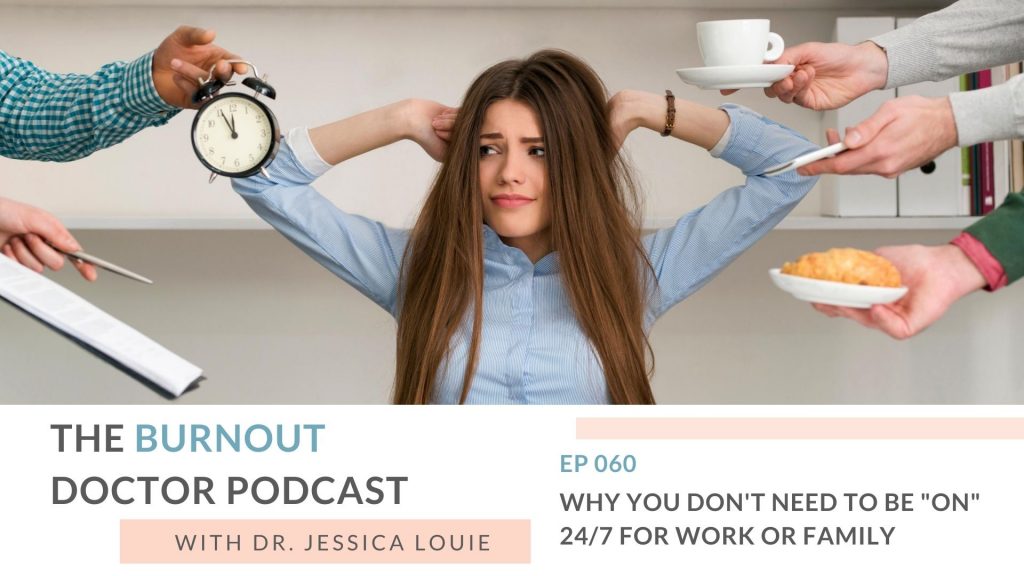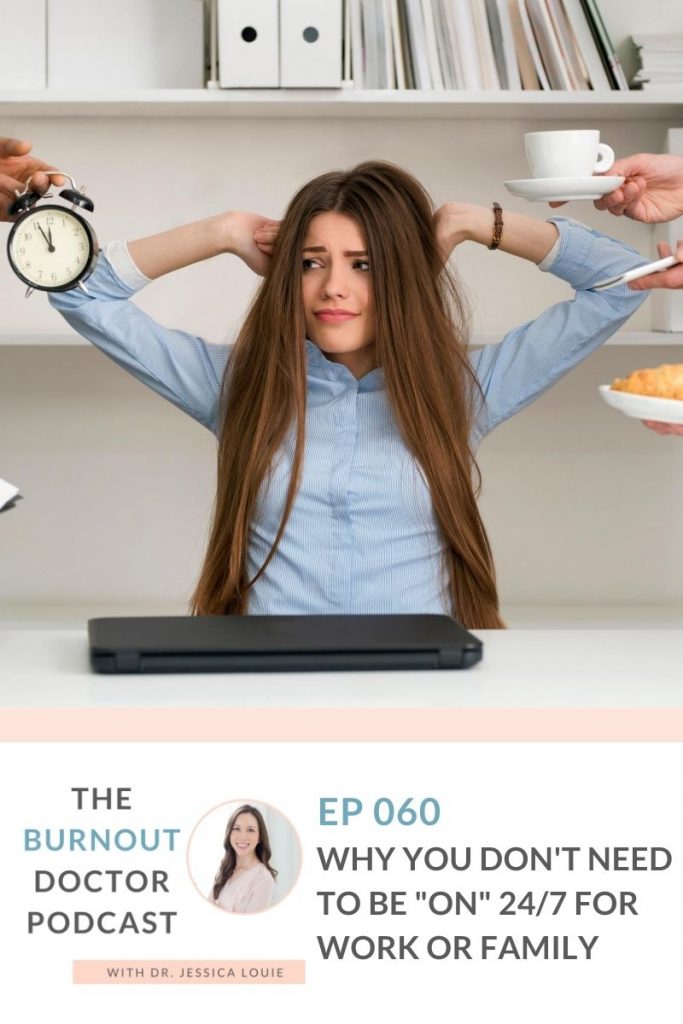
We do NOT need to be available 24/7 to our work or families. Setting work life boundaries to cultivate Work life integration and alignment.
Listen to Podcast: Listen in new window | iTunes | Spotify | Stitcher
Subscribe: Apple Podcasts | Android | Email | Google Podcasts
Download Podcast Workbook
Mentioned on Ep 061: Why being available all the day is hurting everyone around us.
WATCH ON YOUTUBE
Welcome back to The Burnout Doctor Podcast, episode 60, where we are talking about why you don’t need to be “ON” 24 hours a day, 7 days a week for work or for family. Yes, you may feel the pressure to do this so let’s talk about how to shift this mindset. Thank you for the feedback on last week’s episode on why it’s OK to change your mind. Many of you reached out telling me that the fear of changing your mind has affected you in so many ways and letting go of this guilt really helped you. Remember, we all write our own stories in our lives and homes. Let’s all bring joy into home and joy into work.
On today’s episode, we are talking about why you don’t need to feel “ON” all the time. I recently posted about this topic on LinkedIn and was happy to see the discussion and response to it in my messages.
The feeling of being “ON” all the time for work or for family is overwhelming. It affects our mental load and our mental clarity. We become passive members of society. Reacting to everyone else and other people’s schedules.
How do I know this? Because I used to feel like I needed to be available and “ON” ALL THE TIME. I did this for work.
Do you know the feeling?
I checked email constantly. Refreshed the screen. Refreshed on my phone. Checked my email as I got into bed at night. Checked my email as we drive to a family event on a weekend. Responded to a question or comment on my social media post all hours of the day. Responded to a text message RIGHT AWAY from a friend or coworker or family member.
It was exhausting. Responding = reacting = passively living life.
I also heard this recently on a complimentary call with a potential client as she talked about always be available for her family. What if a child called with a problem? Another client on our complimentary discovery call talked about always being available for work emergencies with his leadership position supervising a team. What if an emergency arose and a team member needed to get ahold of me?
Yes, there are times when family and team members have true emergencies. BUT I’ll guess that is a RARE occasion. Don’t believe me? Think back to the last 3 times you reacted to an email, a text, a phone call. What were true emergencies in these situations?
And I mean TRUE emergencies. A child calling to tell you she/he cannot find their favorite art supplies is not a true emergency. A team member calling to tell you that she/he forgot the password for the company system is not a true emergency. Both of these examples highlight our ability to empower those around us to develop critical thinking skills to help themselves first. Constantly answering these calls to be available ALL THE TIME results in children growing up without a culture of responsibility, independence or problem-solving skills. The same applies to our team members. It results in a culture of poor accountability and clearly defined job responsibilities.
We do NOT need to be available 24/7 to our work or to our families.
It’s time to align work INTO our lives and not the other way around. How do I demonstrate this simple yet effective boundary?
I teach others how to communicate with me. I teach my clients, students, and coworkers how to contact me. Email is not for emergencies. Texting is not for emergencies. Phone calls are. I do not respond right away to non-emergency communication; I respond during my time block for addressing that communication. That means 24-48 hours to respond. And no response during vacations or sick days. I turn off these communication tools outside of work hours. And I take it a step further, no email on my phone. Because if you have the urge to mindlessly scroll you may unintentionally check it and have the urge to respond.
If there is a true emergency, someone will find a way to call me. If they do not have my phone number, then it likely isn’t that urgent or they’ll find a way to find my phone number.
Upholding that I’m not available 24/7 helps others develop critical thinking skills while staying true to our own boundaries that life does not revolve around work.
It removes the mental clutter and mental load that we all carry each day.
Work is PART of our life. Not our whole life.
If you’re struggling with this, my coaching program offers 30-minute weekly sessions to check-in for accountability, reflect on progress, answer and guide you through difficulties. Schedule a complimentary call to see if coaching is a fit: DrJessicaLouie.com/coaching.
Until next time, spark joy my friends!
*If you enjoyed this topic, will you take a screenshot of this episode and share it on your Instagram stories and tag me in the post. I’ll re-share it on my own stories.If you haven’t already connected with me, I’m most active on Instagram and LinkedIn – send me a friend invite and tell me what podcast episode has been your favorite!
*Have you given our podcast a review on iTunes? Write us an honest review. This really has helped other pharmacists and healthcare professionals find this podcast, learn from it and grow our community together!
Note, my views are my own and are not associated or representative of my employer(s).
This podcast is for educational purposes only and not medical advice.
LIKE THIS POST?

